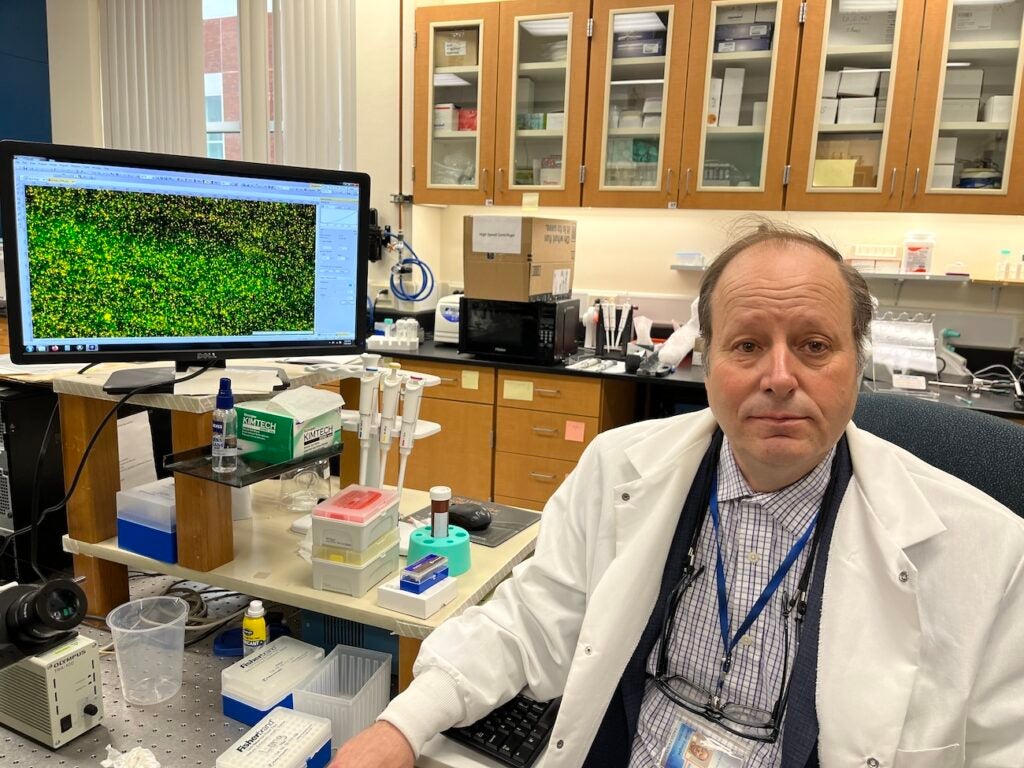
Dr. Daniel Fologea, professor in the Department of Physics and Biomolecular Sciences Graduate Program at Boise State, is working on developing liposome carriers for controlled drug delivery and cancer therapy. Late diagnosis and reduced effectiveness of current cancer treatment approaches make cancer the second leading cause of death in the United States and around the world. In their fight against cancer, doctors most often employ radiotherapy and chemotherapy. However, the systemic nature of chemotherapy limits the dose of drugs that can be used for treatment and prevents simultaneous use with radiotherapy. To alleviate systemic drug distribution issues, scientists proposed and developed a wide variety of liposome-based carriers capable of transporting drugs to the tumor site while minimizing interactions with distal tissues and organs; such liposomes are already FDA approved for cancer treatment.
Nonetheless, a major challenge faces the use of liposomes and other drug carriers for cancer therapy: none of the clinically used liposomes present the ability to release large amounts of drugs at the tumor site in a controlled manner. Instead, the anticancer drugs are released into tumors over a long period of time, which reduces clinical efficiency. To alleviate such shortcomings, scientists proposed numerous approaches for controlling the drug release from liposomes; however, none have been adopted in clinical practice. In addition, drug release triggered by ionizing radiation was not achieved. This is unfortunate since radiation therapy is highly localized, which makes it an optimal approach to activate drug release. To this end, Dr. Fologea recently patented a novel technology that enables simultaneous radiotherapy and chemotherapy by using conformal radiation to initiate and control drug release from accumulated liposomes only to the diseased tissue. In this methodology, radiotherapy also triggers drug release at the targeted site, which is expected to substantially increase the cancer-treatment effectiveness and reduce the systemic, normal tissue toxicity.
The long-term goal of the NSF TRANSFORM Seed grant is to advance the research in Fologea’s group towards technology transfer, clinical trials, and commercialization. The TRANFORM grant, led by Dr. Fologea and Dr. Wingett has enabled substantial collaborations with MDs and scientists from medical schools, biotech companies, and other academic institutions from the USA and abroad. Using ionizing radiation beams to initiate the delivery of antineoplastic drugs is anticipated to translate into a highly effective clinical approach as it utilizes both the excellent local control presented by radiotherapy and the simultaneous delivery of chemotherapeutics. This work will be a significant step toward validating the potential of using radiation exposure as a trigger for drug release. Targeted drug delivery will be practical for solid tumors (lung, brain, breast, prostate, pancreas, etc.) that are traditionally difficult to treat, and this technology could be further developed to assist in controlling drug delivery to any healthy or cancerous tissue.